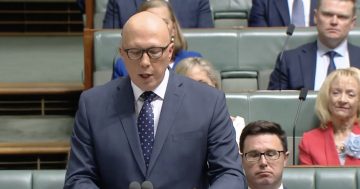
Crosses will not be counted as valid votes in the Voice referendum. Photo: File.
The Federal Court has quashed a legal bid to allow crosses on Voice referendum ballot papers to be counted as ‘No’ votes.
Justice Steven Rares dismissed the application from United Australia Party (UAP) founder Clive Palmer and its senator Ralph Babet.
Justice Rares said a cross could mean numerous things, from disapproval to not wanting to answer the question at all, whereas a tick suggested “an affirmative response” or approval.
In dismissing the bid, Justice Rares also noted the UAP had been deregistered late last year, raising doubt over whether the pair had the authority to lodge the case.
He ordered them to pay costs nonetheless.
The Australian Electoral Commission (AEC) has moved quickly to acknowledge the Federal Court’s ruling regarding referendum voting formality, and has urged voters to write either ‘yes’ or ‘no’ on their ballot papers.
“The Federal Court dismissed an application challenging the referendum voting formality process, which has been in place for decades. As always, the AEC will follow the law,” an AEC statement read.
“For voters at the referendum, it remains simple – to ensure you cast a formal vote, follow the voting instructions by writing either ‘yes’ or ‘no’ on your ballot paper.”
The AEC has maintained, however, that a tick would be counted as a ‘Yes’ vote, something else the UAP tried to change in court.
In the Federal Court, the AEC argued it was following the same clear legal advice it had received for many years about referendum voting formality.
The AEC has released extracts of that legal advice, from 1988 to 2023.
In 1988, the Attorney-General’s Department (now the Australian Government Solicitor) advised the AEC: “… ballot-papers marked with ticks only would be formal, the ticks denoting approval in each case. However, ballot-papers marked with crosses only would be informal as there would be no clear indication of the voter’s intention. A cross may be used, by itself, variously to denote approval or disapproval.”
Earlier this year, the Australian Government Solicitor confirmed this 1988 advice to the AEC: “A referendum ballot paper posing only one question marked with a tick should be treated as formal. This is because it is equivalent to a ballot paper marked ‘Yes’.
“However, a ballot paper posing only one question marked with a cross should be treated as informal because it provides no clear indication of the voter’s intention. This is because a cross may be used, by itself, variously to denote approval or disapproval.”
The AEC has noted Australian voters are “rightly proud of their electoral system”, one of the most “transparent and robust” voting systems in the world.
“As a result, there is an intense, and highly appropriate level of public interest in all aspects of that system, and associated commentary online and in mainstream media,” an AEC statement read.
“Sometimes this commentary is immediate and based on emotion rather than the reality of the law which the AEC must administer.
“There has been intense commentary online and in mainstream media regarding what will and will not be a formal vote for the 2023 referendum; specifically around whether or not a ‘tick’ or a ‘cross’ will be able to be counted. Much of that commentary is factually incorrect and ignores:
- the law surrounding ‘savings provisions’;
- the longstanding legal advice regarding the use of ticks and crosses; and
- the decades-long and multi-referendum history of the application of that law and advice.
“The AEC completely and utterly rejects the suggestions by some that by transparently following the established, public and known legislative requirements we are undermining the impartiality and fairness of the referendum.
“As has been the case at every electoral event, the AEC remains totally focussed on electoral integrity. Indeed, electoral integrity is a central part of the AEC’s published values; underpinned by, and supported through, complete adherence to all relevant laws and regulations.”
The AEC noted more than 99 per cent of votes cast at the 1999 federal referendum were formal.
It said of the 0.86 per cent of informal votes, many would have had no relevance to the use of ticks or crosses.
Original Article published by Chris Johnson on Riotact.









